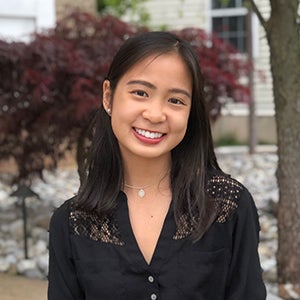Major: Kinesiology - Sports Medicine
Minor: Biochemistry and Cell Biology
Certificate: Spanish
Research Advisor: Dr. Alli Antar, Baylor College of Medicine
Corina Do ’23 knew that she wanted to be on the pre-med path when she came to Rice. “My mom’s career in pharmaceuticals exposed me to the importance of research and development of drugs and my brother, also on the pre-med track, gave me a ‘run-down’ of the pros and cons of medicine,” she said.
Initially planning to major in biosciences, Corina switched to the kinesiology sports medicine major when she learned that she prefers to look at the body from the outside versus the inside. “While biochemistry mainly focused on the molecular technicalities, in the sports medicine major, I related my everyday hobbies and activities — like swimming, running and cooking — to their impacts on my health,” she said.
Corina’s love of cooking is also reflected in her favorite courses. “Throughout my life, food has been a language of love, friendship and upholding traditions. I’ve loved cooking ever since I learned how to cook my mom’s egg rolls and pho,” she said. “Through Dr. Anding’s nutrition course, I learned the science of foods — food as medicine, filled with vital fuel, nutrients and vitamins.” Rice’s community gardening course also provides Corina with fresh crops to use as she makes family favorite recipes a bit more nutritious and shares new recipes with friends on Instagram.
Corina also explores her interest in nutrition through her research with Dr. Alli Antar in the Children’s Nutrition Research Center of Baylor College of Medicine. “My interest in nutrition drew me to shadow endocrinologists. I realized how complex of a disease obesity and diabetes are, as they are both strongly associated with lifestyle,” said Corina. “I also realized that social determinants, such as access to food or the ability to exercise, have a great effect on patients with obesity and diabetes. This made me determined to find better ways to treat diabetes.”
Her research focuses on brown adipose tissue (BAT) — a type of body fat that is activated when you get cold. When activated, BAT uptakes lipids and glucose and breaks them down. If Corina’s research can find ways to activate BAT tissue in humans, this may help researchers develop new treatments for diabetes.
Corina found her research position by scrolling through nutrition-related labs in the Texas Medical Center and sending a cold email to the professor. “Don’t hesitate to reach out,” she said. “You have nothing to lose! Professors will really appreciate a student that shows interest in their project.”
Outside of her coursework, Corina keeps busy as the president of the Rice Vietnamese Student Association and the Rice Biosciences Society, where she helps provide opportunities for students to learn about the wide range of research and career opportunities in the biosciences. She also volunteers at Houston Methodist Hospital and Casa El Buen Samaritano, where she improves her Spanish-speaking skills as she works with Hispanic patients that are uninsured or from underserved communities. “Many of the patients are diabetic, so it is interesting to relate my research and knowledge of nutrition to see how the doctors’ treatments will improve their condition, but always remembering to accommodate for the patient’s specific lifestyle and preferences.”

